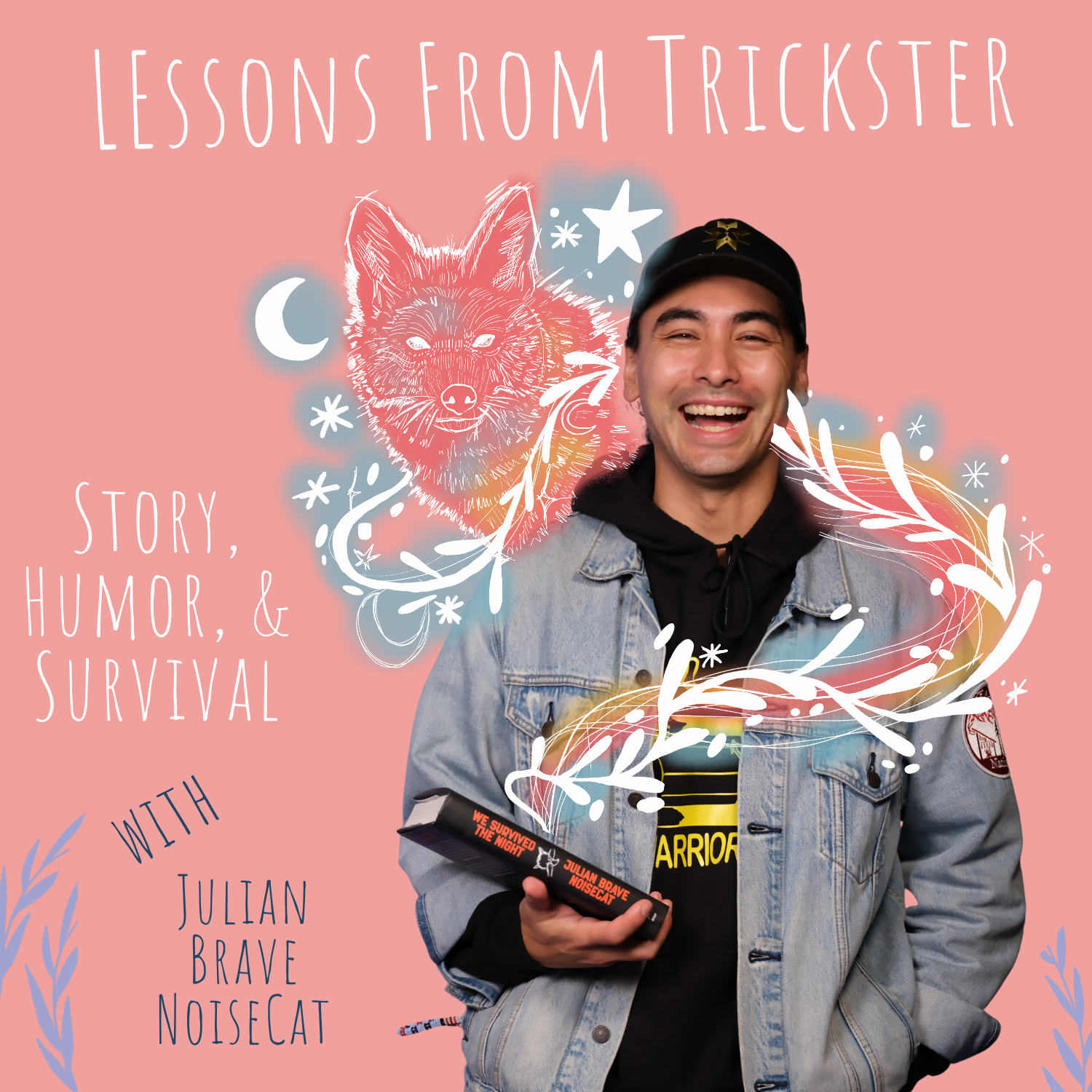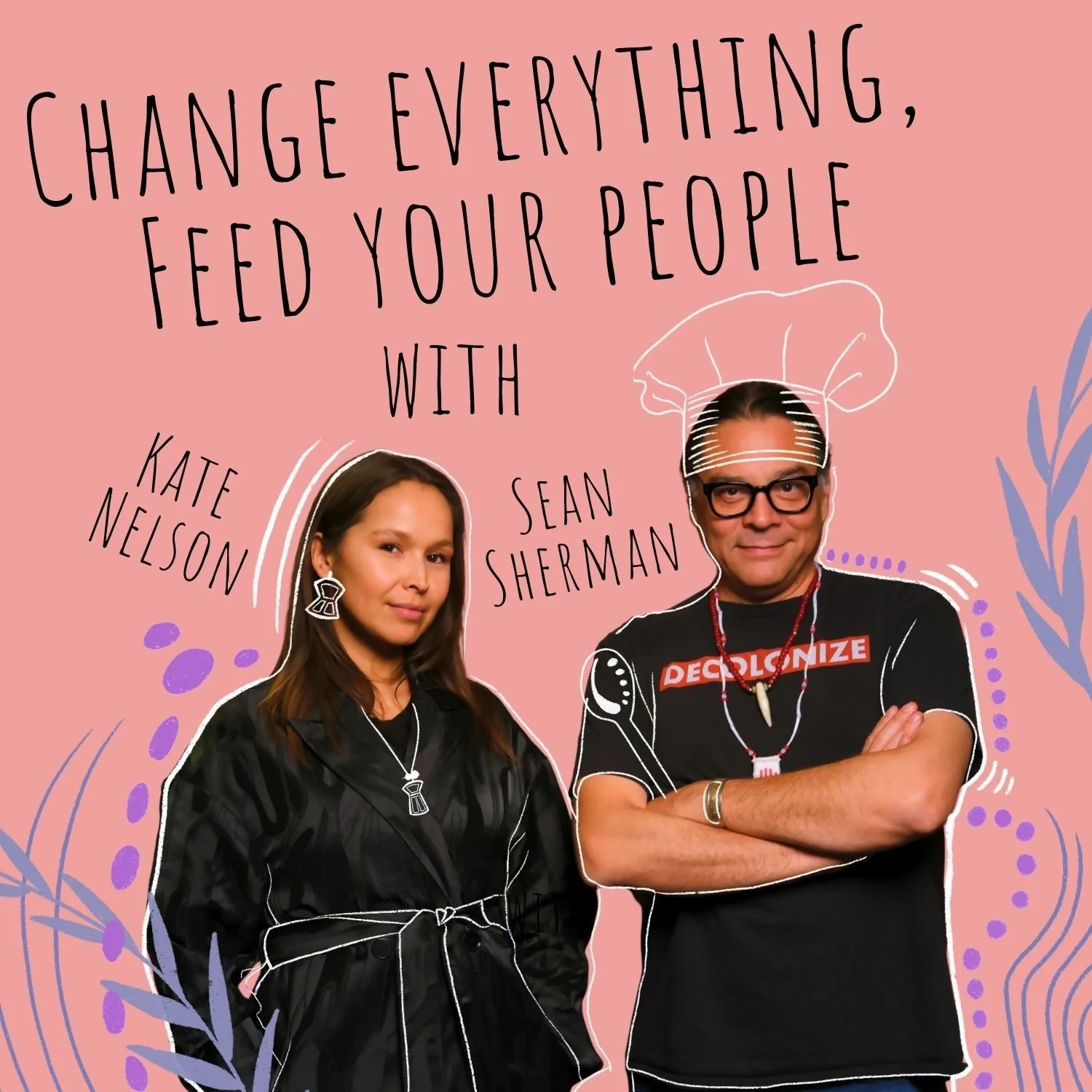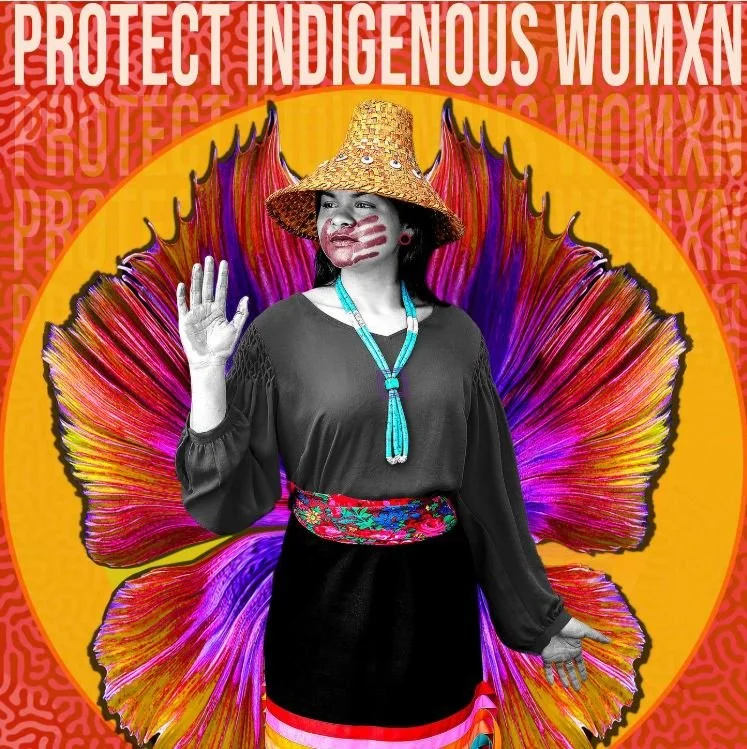
Lessons from Trickster: Story, Humor and Survival with Julian Brave NoiseCat
What can we learn from the ultimate Trickster?
On the latest episode of All My Relations, we’re joined by writer, filmmaker, and activist Julian Brave NoiseCat (Tsq’secen / Secwépemc) to talk about storytelling as survival, truth-telling, and love.
We dive into his book We Survived the Night, written in the tradition of a Coyote story, and the ways dark Indigenous humor, oral storytelling, and ancestral teachings help us understand human nature—and each other. Julian reflects on Coyote as an epic trickster forefather, a guide for navigating grief, contradiction, and a world still full of trickster energy.
We also talk about why our stories aren’t myths or folklore, why Indigenous languages matter, and how multiple truths can coexist in a living tradition that continues to teach us what we need to know.
These stories survived colonization.
They survived the night.
And they’re still speaking.

Change Everything, Feed Your People with Sean Sherman and Kate Nelson
What happens when food becomes a blueprint for liberation? On this episode of All My Relations, we’re joined by Chef Sean Sherman (Oglala Lakota) and journalist/co-author Kate Nelson (Tlingit) to talk about Turtle Island—a cookbook, a history lesson, and a future-facing manifesto for Indigenous food sovereignty. We get into what it means to remove colonial borders (and colonial ingredients), why Indigenous foodways are global and relational, and how Sean’s nonprofit model is moving real resources back into Indigenous communities—from Native producers to Native jobs. Along the way: moose stew, fir tips, colonized palates, seed keepers, Buffalo Bird Woman’s garden, and a clear-eyed conversation about ICE, labor, and who actually feeds this country. Food is the entry point—but sovereignty is the goal. Just change everything. Feed your people.

Protect Indigenous Women
Since the onset of colonization Indigenous women have experienced violence with reckless abandon, today it is a public health emergency. Traditionally, many of our Native societies are matrilineal but settler colonialism has disrupted our traditional value systems. These shifts have tragically contributed to the epidemic of violence we see committed against our women and Two Spirit relations. The issue is systemic and this episode discusses how we must hold systems and people accountable.

Indigenous Artist To Artist, Part 3: Who Decides?
Join Matika and Adrienne In conversation with Jami Powell (Osage), Jaclyn Roessel (Diné) and Kristin Dorsey (Chickasaw), for the third and final episode of Indigenous Artist to Artist, Part 3: Who Decides? as we discuss the importance of indigenous people presenting, curating, and exhibiting themselves.

Indigenous Artist To Artist, Part 2: We Choose Power
We welcome you into this intimate laughy conversation with three awesome full time artists--Photographer Ryan Redorn (Osage), painter Yatika Star Fields (Cherokee, Creek and Osage) and traditional tattoo artist Holly Nordlum (Inupiaq) for this second episode of Indigenous Artist to Artist as we discuss the importance of indigenous people holding space in the art world, the difference between help and inherent power, while we dare to imagine an otherwise— how beautiful might our world be if Native people were at the helm?

Indigenous Artist to Artist (Part 1): Adapting To Pandemic & Daring to Dream (Copy)
We welcome you into this intimate laughy conversation with three awesome full time artists--Photographer Ryan Redorn (Osage), painter Yatika Star Fields (Cherokee, Creek and Osage) and traditional tattoo artist Holly Nordlum (Inupiaq) for this second episode of Indigenous Artist to Artist as we discuss the importance of indigenous people holding space in the art world, the difference between help and inherent power, while we dare to imagine an otherwise— how beautiful might our world be if Native people were at the helm?

Healing The Land IS Healing Ourselves
Join us for a discussion with community organizer, citizen scientist, activist, water protector, entrepreneur, writer, gardener, and all around incredible Diné woman, Kim Smith. We talk with Kim about her work, aiming to understand how violence on the land is violence on our bodies, and that the inverse can also be true—healing the land is healing ourselves. Kim tells us about her 1200+ mile journey with Nihígaal Bee Lina (Journey For Existence) which walked to all of the sacred mountains of her people. She also discusses her work healing land in her home town of St. Michaels, Arizona and her long-term citizen science project to collect data from Navajo people about the impact of extractive energy plants in their homelands, and so much more.

Whole Family Wellness
Join us for a discussion with Well For Culture founders Thosh Collins (WhaZhaZi, Haudenosaunee and O’otham) and Chelsea Luger (Anishinaabe & Lakota) as we discuss Whole Family Wellness. We cover an indigenous approach to prenatal, baby, postpartum, fatherhood, and a whole family approach to wellness. They study and implement lifestyle teachings of indigenous ancestors, while incorporating new information to contribute to ancient and ongoing chains of knowledge. Indigenous culture has always been dynamic, and wellness is an inherent aspect. Their good words help us to feel grounded amidst this time of pandemic, and we hope you will find comfort in their teachings as well.

Growing New Beginnings
Today we launch Season 2 of All My Relations: “Growing New Beginnings”! This episode was recorded around the new year when the world was functioning without Covid-19, and we were emerging from our off-season hibernation, reveling in new life, and trying to figure out a healthy and wellness-focused way forward. Then, things changed, and we sat on the episode for a bit. We decided to bring the conversation up to speed with the current moment and talk about how we’re riding out the pandemic in our homes, mourning losses and feeling scared, but also continuing to grow.

Bonus Episode: All Our (Socially Distanced) Relations
This bonus episode explores the impacts of Covid-19 in tribal communities. Even though tribal nations are most at risk, Indigenous voices have been widely left out of mainstream news coverage. Nationally, health experts and tribal leaders are sounding the alarm that Native Americans are particularly vulnerable to the spread of Covid-19. During this time of crisis, it is critically important to hear from national leadership.

Love in the Time of Blood Quantum
Hundreds of years ago when colonizers instituted the idea of “blood quantum” as a means of reducing the Native population, our Native ancestors probably did not envision a modern Indigenous world of Tinder, multi-billion dollar tribal enterprises and per cap payments, or a world where who we love might determine if our children are considered Indigenous at all. Last episode we talked about Blood Quantum through history, law, science, and policy. In this episode, we’ll approach the topic on a more personal level--how does it affect our love lives?

Beyond Blood Quantum
Blood quantum. The percentage of Native “blood” one possesses, the fraction listed on Certificates of Degree of Indian Blood, and a fraught concept that has its defenders and dissenters in our communities. Despite its colonial origins, many tribes still use blood quantum as a requirement for tribal enrollment, and these fictional fractions carry huge weight in the lives of Indigenous Peoples. In this episode we hope to parse out some of these complications around the topic of blood quantum—legally and interpersonally, as well as the ways these metaphors of blood have moved into genetic science.

Can Our Ancestors Hear Us?
On this episode we tackle a huge topic: the importance and power of our Indigenous languages, and the work that's being done to revitalize and promote Native languages. It was too much to fit in with just one guest, so we collected stories from throughout Indian Country, talking to Thelma Whiskers from Southern Ute, Harry Oosahwee from Cherokee Nation, Henrietta Mann from Cheyenne Nation, Amber Heywood and Archie Cantrell from Puyallup, and Tia Averett Pocknett and Sola Santos from Mashpee Wampanoag.

Can a DNA test make me Native American?
Can a DNA test make me Native American? As direct-to-consumer ancestry DNA tests gain popularity and narratives of “discovering” or “proving” Native American ancestry through DNA swirl through the media—what does that mean for Indigenous nations?

Ep #1: All My Relations & Indigenous Feminism
Matika and Adrienne discuss their “origin” stories as Indigenous women, bloggers, and storytellers— revealing the intimacies of their friendship, the inception and goals of the All My Relations Podcast, and their relationships to feminism.
